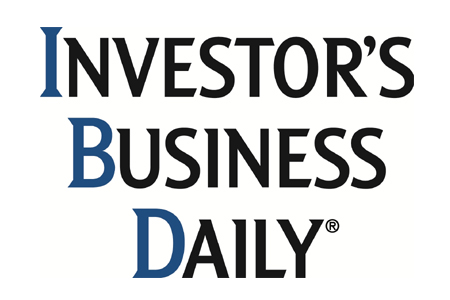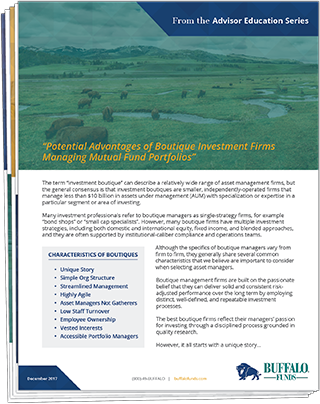No Results Found
The page you requested could not be found. Try refining your search, or use the navigation above to locate the post.
Home > Insights & News > White Papers & Research > PM Insights
The Buffalo International Fund (BUFIX) portfolio managers, Bill Kornitzer, CFA, and Nicole Kornitzer, CFA, recently held a live Q&A session for investment advisors, who posed questions regarding the current state of the international markets:
What’s your take on the current status of the international market in relation to the U.S. cycle?
Bill Kornitzer (4:20)
What is your opinion on President Trump’s recent announcement regarding tariffs?
Bill Kornitzer (8:10)
Nicole Kornitzer (0:58)
INVESTMENT PHILOSOPHY & PROCESS
The BUFIX portfolio managers also gave more insight into their process and investment philosophy:
Can you give us an example of a company in the portfolio that shows your process at work?
Bill Kornitzer (5:36)
Nicole Kornitzer (3:26)
What differentiates your fund from others?
Bill Kornitzer (2:34)
Nicole Kornitzer (1:08)
If you are a financial professional and would like to set up a call with one of our portfolio managers, please send a request to advisors@buffalofunds.com.

“World markets are relatively inexpensive compared to the U.S., by the widest margin in 10 years. Given the credit backdrop and where we are in the economic cycles and where stocks are priced, the opportunity is really skewed more favorably towards the international scene.“
~ Bill Kornitzer, Co-Portfolio Manager, Buffalo International Fund
BUFIX Q4 Fact Sheet
BUFIX Q4 PM Commentary
Latest Whitepaper – “Why Invest Internationally NOW”
BUFIX Fund Managers
The page you requested could not be found. Try refining your search, or use the navigation above to locate the post.
Annualized Performance (%)
| As of 3/31/24 | 3 MO | YTD | 1 YR | 3 YR | 5 YR | 10 YR | Since Inception |
|---|---|---|---|---|---|---|---|
| BUFFALO INTERNATIONAL FUND - Investor | 5.43 | 5.43 | 10.89 | 4.10 | 9.59 | 7.64 | 5.79 |
| BUFFALO INTERNATIONAL FUND - Institutional | 5.48 | 5.48 | 11.08 | 4.24 | 9.76 | 7.80 | 5.95 |
| FTSE All World Ex-US Index | 4.54 | 4.54 | 13.99 | 2.55 | 6.70 | 4.95 | 3.20 |
| Lipper International Fund Index | 5.86 | 5.86 | 14.72 | 3.08 | 7.61 | 5.11 | 3.34 |
Annual expense ratio: 1.05%. The Morningstar category average represents a universe of funds with similar objectives. Average annual total return represents past performance and is no guarantee of future results. Investment return and principal value will fluctuate and redemption value may be more or less than original cost. Fund performance current to the most recent month-end may be lower or higher than the performance quoted and can be obtained here.
Opinions expressed are subject to change, are not intended to be a forecast of future events, a guarantee of future results, nor investment advice.
As of 12/31/17, the Buffalo International Fund held CTS Eventim (1.05%) and Sartorius Stedim Biotech (1.50%). Fund holdings are subject to change and should not be considered a recommendation to buy or sell any security.
ECB stands for European Central Bank. “S&P trailing PE” references the S&P 500 price-to-earnings ratio, based on the trailing twelve months. The S&P 500 is a capitalization weighted index of 500 large capitalization stocks which is designed to measure broad domestic securities markets. The Russell Global is an unmanaged index that measures the performance of the global equity market based on all investable equity securities, excluding companies assigned to the United States. It is not possible to invest directly in an index. EBITDA stands for Earnings Before Interest, Taxes, Depreciation, and Amortization. R&D is research and development. FDA is the Food and Drug Administration. TPP stands for Trans-Pacific Partnership. UK stands for United Kingdom. EU stands for European Union. VAT stands for Value-Added Tax. GDP stands for Gross Domestic Product.
Stay up-to-date with the most recent media coverage and press releases about the Buffalo Funds.

Buffalo Funds Small Cap co-portfolio manager Jamie Cuellar, CFA, was recently interviewed by The Wall Street Transcript, where he discussed how his team analyzes small-cap company valuations and why they view the asset class as very inefficient. He also provides several examples of companies within his portfolio that highlight his team’s investment strategy at work:
Jamie also gave his outlook on small-cap companies in the United States in the coming year, including the impact of the current economy, the recent tax cuts, and the repatriation of corporate cash holdings back to the United States.
“We believe that by investing in an actively managed and diversified portfolio of companies that benefit from long-term industrial, technological or general market trends, and trading at attractive valuations, are going to lead to superior growth of capital over time.“ ~ Jamie Cuellar, CFA, Co-Portfolio Manager, Buffalo Small Cap Fund
To access The Wall Street Transcript article click here.

Performance data quoted represents past performance; past performance does not guarantee future results. The investment return and principal value of an investment will fluctuate so that an investor’s shares, when redeemed may be worth more or less than their original value. Current performance may be lower or higher than the performance quoted. Performance data current to the most recent month-end may be obtained here. Performance data current to the most recent quarter-end may be obtained here.
Diversification does not assure a profit, nor does it protect against a loss in a declining market.
Active investing has higher management fees because of the manager’s increased level of involvement while passive investing has lower management and operating fees. Investing in both actively and passively managed mutual funds involves risk and principal loss is possible. Both actively and passively managed mutual funds generally have daily liquidity. There are no guarantees regarding the performance of actively and passively managed mutual funds. Actively managed mutual funds may have higher portfolio turnover than passively managed funds. Excessive turnover can limit returns and can incur capital gains.
Opinions expressed are those of the author or Funds and are subject to change, are not intended to be a forecast of future events, a guarantee of future results, nor investment advice.
References to other mutual funds should not to be considered an offer to buy or sell these securities.
A complete list of the Fund’s holdings can be found here. Fund holdings are subject to change and should not be considered a recommendation to buy or sell any security.
Earnings growth is not representative of the fund’s future performance.
AUM stands for Assets Under Management. API stands for Application Programming Interface. ARPU stands for Average Revenue Per User. SMB stands for Small/Medium-size Business. EBITDA stands for Earnings Before Interest, Taxes, Depreciation, Amortization. Cash flow is the total amount of money being transferred into and out of a business. REIT stands for Real Estate Investment Trust. Dividend yield is a dividend expressed as a percentage of a current share price. GDP stands for Gross Domestic Product. M&A stands for Mergers & Acquisitions. P&L stands for Profit & Loss. The Russell 2000 is an unmanaged index that consists of the smallest 2,000 securities in the Russell 3000 Index, representing approximately 10% of the Russell 3000 total market capitalization. It is not possible to invest directly in an index.
Jamie Cuellar, co-portfolio manager, discusses how his team analyzes small-cap company valuations and why they view the asset class as very inefficient, while providing several examples of companies within his portfolio that highlight his team’s investment strategy at work.
Joel Crampton
Director of Marketing
(913) 647-9881
Stay up-to-date with the most recent media coverage and press releases about the Buffalo Funds.

The Buffalo Discovery Fund (BUFTX) is an Investor’s Business Daily 2018 Best Mutual Funds Award Winner, in the 3rd annual ranking by the investment publication, announced this week. BUFTX was included in 3 categories:
Funds named to IBD’s list were chosen because they have outperformed the broader market over the past 1, 3, 5, and 10-year periods, as of 12/31/17. In order to make the list, funds must have outperformed in all four time periods. IBD made its selections from 2,806 mutual funds that met the criteria of having at least $100 million in assets and 10 years of operation.
“We’re honored that our Discovery Fund has been recognized in this way by IBD. This fund exemplifies our firm’s goal of consistently delivering strong risk-adjusted performance to our shareholders,“ said Clay Brethour, president of the Buffalo Funds and co-manager of the Buffalo Discovery Fund.
The Buffalo Discovery Fund is managed by Clay Brethour and Dave Carlsen, a team that has been in place since 2004.
Originally launched in 2001 as the Science & Technology Fund, the Discovery Fund has consistently delivered benchmark-beating performance since inception, with a focus on innovation as a key driver in their outperformance. IBD recently profiled the Fund in their March 2018 edition: Innovators Fuel Buffalo Discovery Fund Outperformance
To view IBD’s complete list and analysis of the Best Mutual Funds 2018, please visit: www.investors.com/best-mutual-funds-awards
| As of 12/31/17 | 1 YR | 3 YR | 5 YR | 10 YR |
|---|---|---|---|---|
| Buffalo Discovery Fund | 25.44 | 11.84 | 16.16 | 11.46 |
| Russell Midcap Growth Index | 25.27 | 10.30 | 15.30 | 9.10 |
| S&P 500 Index | 21.83 | 11.41 | 15.79 | 8.50 |
Performance data quoted represents past performance; past performance does not guarantee future results. The investment return and principal value of an investment will fluctuate so that an investor’s shares, when redeemed may be worth more or less than their original value. Current performance may be lower or higher than the performance quoted. Performance data current to the most recent month-end may be obtained here. Performance data current to the most recent quarter-end may be obtained here. Performance is annualized for periods greater than 1 year.
Opinions expressed are those of the author or Funds and are subject to change, are not intended to be a forecast of future events, a guarantee of future results, nor investment advice.
References to other mutual funds should not to be considered an offer to buy or sell these securities.
BUFTX named to Investor’s Business Daily Best Mutual Funds 2018 list in the Midcap, U.S. Diversified, and Growth fund categories.

Joel Crampton
Director of Marketing
(913) 647-9881
The page you requested could not be found. Try refining your search, or use the navigation above to locate the post.
Stay up-to-date with the most recent media coverage and press releases about the Buffalo Funds.

The biggest trend in the mutual fund business over the past several years has been the move to passively-managed index funds. However, we believe, when volatility and the eventual end to the bear market returns, the value of active investing will shine. With index funds tied to downward market action, experienced portfolio managers at active funds will be attempting to minimize the damage, while setting the stage to potentially maximize returns on the rebound.
Despite the trends, the Buffalo Funds family has been making moves to capitalize on future growth opportunities:
Positioning the company to capitalize on stock market swings and economic volatility has allowed the Buffalo Funds to survive the bear markets of the 90s, the dot-com boom and bust, and the Great Recession.
“Ever since Buffalo Funds was launched 24 years ago, we’ve regularly come up with long-term sector growth trends to build the foundation of our funds. We pick industry sectors we expect to grow regardless of what’s happening in the economy.“ ~ Clay Brethour, CFA, President, Buffalo Funds
To access the Kansas City Business Journal article click here.

Performance data quoted represents past performance; past performance does not guarantee future results. The investment return and principal value of an investment will fluctuate so that an investor’s shares, when redeemed may be worth more or less than their original value. Current performance may be lower or higher than the performance quoted. Performance data current to the most recent month-end may be obtained here. Performance data current to the most recent quarter-end may be obtained here.
Active investing has higher management fees because of the manager’s increased level of involvement while passive investing has lower management and operating fees. Investing in both actively and passively managed mutual funds involves risk and principal loss is possible. Both actively and passively managed mutual funds generally have daily liquidity. There are no guarantees regarding the performance of actively and passively managed mutual funds. Actively managed mutual funds may have higher portfolio turnover than passively managed funds. Excessive turnover can limit returns and can incur capital gains.
As of 12/31/17, none of the Buffalo Funds held positions in Aflac, CB Richard Ellis, Larson Financial Services, Cartwright Cos., Ascend Learning, or Datacore Marketing. Fund holdings are subject to change and should not be considered a recommendation to buy or sell any security.
Opinions expressed are those of the author or Funds and are subject to change, are not intended to be a forecast of future events, a guarantee of future results, nor investment advice.
With index funds tied to downward market action, experienced portfolio mangers at active funds attempt to minimize the damage and set the stage to potentially maximize returns on the rebound.
Joel Crampton
Director of Marketing
(913) 647-9881
Stay up-to-date with the most recent media coverage and press releases about the Buffalo Funds.

“The best boutique firms reflect their managers’ passion for investing through a disciplined process grounded in quality research.”
The term “investment boutique” can describe a relatively wide range of asset management firms, but the general consensus is that investment boutiques are smaller, independently-operated firms that manage less than $10 billion in assets under management (AUM) with specialization or expertise in a particular segment or area of investing.
We believe the boutique model offers an attractive alternative to large firms and should be a factor investors examine when making investment decisions.
Characteristics of boutique firms include:
|
|
The sharp focus on a particular slice of the financial markets, coupled with disciplined, time-tested investment strategies managed by stable, long-tenured investment teams, working in close collaboration together, may help advisors provide their clients with compelling results over time.
Opinions expressed are those of the author or Funds and are subject to change, are not intended to be a forecast of future events, a guarantee of future results, nor investment advice.
We get to know the companies we invest in and learn how they run their business.
We identify Top-Down broad, secular growth trends and search for companies from the Bottom-Up.
We construct our portfolios based on our own proprietary investment strategy.
Sticking to our disciplined investment strategy ensures we maintain a consistent, balanced approach.
In this latest Industry Perspectives, we discuss:
Active investing has higher management fees because of the manager’s increased level of involvement while passive investing has lower management and operating fees. Investing in both actively and passively managed mutual funds involves risk and principal loss is possible. Both actively and passively managed mutual funds generally have daily liquidity. There are no guarantees regarding the performance of actively and passively managed mutual funds. Actively managed mutual funds may have higher portfolio turnover than passively managed funds. Excessive turnover can limit returns and can incur capital gains. Stocks, hedge funds, mutual funds, ETFs and other investments products have different risk/return profiles, which should be considered when investing. All investments contain risk and may lose value.
We get to know the companies we invest in and learn how they run their business.
We identify Top-Down broad, secular growth trends and search for companies from the Bottom-Up.
We construct our portfolios based on our own proprietary investment strategy.
Sticking to our disciplined investment strategy ensures we maintain a consistent, balanced approach.
Stay up-to-date with the most recent media coverage and press releases about the Buffalo Funds.